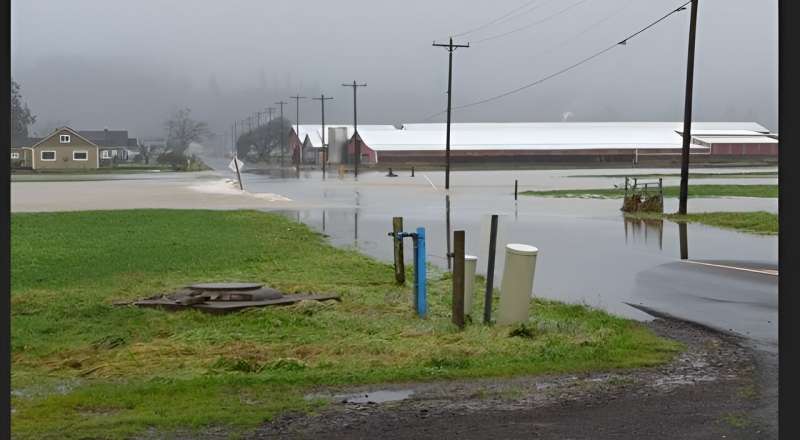This article has been reviewed according to Science X's editorial process and policies. Editors have highlighted the following attributes while ensuring the content's credibility:
fact-checked
trusted source
proofread
Flood-prone communities in Oregon have low trust in agencies responsible for helping them, survey shows

Tillamook residents have always dealt with flooding—they sit at the confluence of five rivers where coastal storm surges and high tides push in large amounts of seawater. But the heavy rains that washed out roads, forced vehicle rescues and prompted a state of emergency in early December is a reminder that more frequent and severe flooding will come with climate change and sea-level rise.
So what to do about it? New survey data from Portland State researchers suggests that the success of any future flood mitigation efforts will require community buy-in and trust—something that is low on the Oregon Coast.
Melissa Haeffner, an associate professor of environmental science and management, and her research team—economics professors Sahan Dissanayake and Forrest Williams, Rebecca McLain, research director for PSU's National Policy Consensus Center, and doctoral student Wendy Sangucho Loachamin—combined community surveys, focus groups and a behavioral economics game experiment to measure how trust in institutions influences people's decision-making when considering the costs and benefits of supporting flood mitigation proposals.
Such efforts can range from infrastructure like seawalls, dikes and tide gates to nature-based options like restoring floodplains or marshes and policy solutions like flood insurance and buy-out programs.
The team looked at three elements of trust: competence, dependability and integrity.
"We wanted to get a deeper understanding about what it is that people trust or don't trust about how institutions are responding to sea level rise and increased flooding," Haeffner said. "You can think an agency is bad but if you think they're competent, then you trust them to do a good job. Or they may be dependable but they are dependably incompetent."
Overall, the preliminary data shows that respondents have a relatively low level of trust in institutions across the board. They tend to trust local and state institutions more than federal agencies and tend to view local institutions as more dependable than state or federal agencies. In an experiment, when given a hypothetical $10, almost no one was willing to give the full amount to a federal representative because they didn't think they'd get a good return on their investment.
"If people don't trust agencies in some way, then the agencies are going to see more opposition," Haeffner said. "People aren't going to vote to raise their taxes for these types of [flood mitigation projects] or they might even protest or disrupt a project."
Haeffner hopes that agencies will see trust as an important metric to measure when evaluating the success of any project—it's not enough to put in a dike and call it good because there's less flooding; agencies have to know how much that project built trust with communities to be able to do more in the future.
A promising finding is that respondents overall support the idea of flood mitigation and would be willing to pay between $25/month to $100/month for a program, depending on specifics. The research team also found that people prefer natural or built solutions over policy solutions. Residents shared anecdotally that recent land restoration projects done by the city have resulted in less flooding downhill.
"Nature-based strategies are relatively new in flood mitigation, but they've seen it's working," Haeffner said. "As the infrastructure ages out, another question arises: Are we going to keep rebuilding these big physical infrastructures or are we going to try something different?"
The research team will be traveling to the coast in January to share their findings with the Tillamook Bay Flood Improvement District.
Provided by Portland State University





















